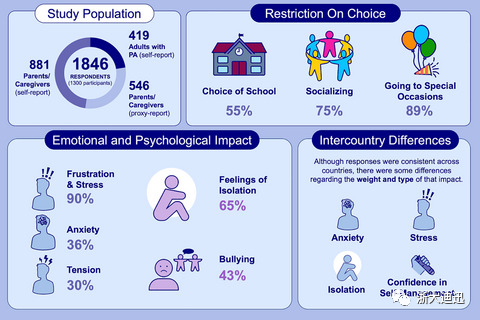Allergy:欧洲多国调查评估花生过敏对社会心理的影响
发布日期:2020-11-20
原标题:欧洲多国调查评估花生过敏对社会心理的影响
方法:“花生过敏对情感和生活的影响”是一项在欧洲8个国家开展的,由八位患者倡导小组的代表和五位医疗保健研究专家共同主持的线上调查。符合条件的受访者群体包括:诊断为花生过敏的成人(自诉);父母/非父母看护者(花生过敏儿童的代理报告);以及父母/非父母看护者(自诉花生过敏对其自身有影响)
结果:在总共1846名研究对象中,有419位花生过敏成人患者(自诉),546位是父母/看护者(代理报告),881名是父母/陪护者(自诉)。大多数受访者表示生活中在饮食(84%-93%)方面受到限制较大,其他像聚会、社交、度假及乘坐公共交通工具等方面也受到一定程度的限制(53%-89%)。大约40%的人称自己为“非常”沮丧和“非常”紧张,三分之二(65%)的人感到与社会存在隔阂,43%的人在生活中曾受到欺压,只有不到一半的人知道何时使用肾上腺素自动注射器。本调查还观察到不同国家间存在差异,例如爱尔兰的受访者表现出高度不确定性和高度紧张,德国受访者的焦虑率最高,法国受访者普遍感到被社会排斥和被孤立。
结论:花生过敏对患者本人及其看护者们的社会心理都会产生不利影响,导致出现沮丧、紧张和孤立等情感,因此在研究和临床实践中应当关注花生过敏在医疗保健和公共教育方面的问题。

延伸阅读
Allergy
DOI: 10.1111/all.14363
Abstract:
Background: Peanut allergy (PA) is a common, potentially life-threatening and typically lifelong condition with a significant burden of illness. However, information is lacking on how persons with PA (PwPA) and their caregivers perceive the psychosocial impact of living with PA. The Allergy to Peanuts imPacting Emotions And Life 1(APPEAL-1) survey, conducted across Europe, investigated the experience and impact of living with PA. Here, we report data evaluating the psychosocial impact of PA on PwPA and their caregivers.
Methods: Allergy to Peanuts imPacting Emotions And Life study 1 was an online survey conducted in eight European countries. Representatives of eight patient advocacy groups and five healthcare-research specialists developed the survey. Eligible respondent groups included the following: adults diagnosed with PA (self-report);parent/nonparent caregivers (proxy-report for a child with PA); and parent/nonparent caregivers (self-report of PA impact on themselves).
Results: Of 1846 total study respondents, 419 were adults with PA (self-report); 546 were parents/caregivers (proxy-report); and 881 were parents/caregivers (selfreport). Most respondents reported lifestyle restrictions regarding food (84%-93%) and additional domains including parties and socializing, holiday activities and destinations, and taking public transport (53%-89%). Approximately 40% rated themselves as “very” frustrated and “very” stressed. Two-thirds (65%) felt socially isolated; 43% were bullied. Less than half felt confident in knowing when to use an adrenaline autoinjector. Several intercountry differences were observed such as high levels of uncertainty and stress in respondents from Ireland, highest rates of anxiety in respondents from Germany, and social exclusion and isolation most common in respondents from France.
Conclusion: Peanut allergy imposes an adverse psychosocial impact on patients and caregivers, leading to frustration, stress and isolation. Attention to the impact of PA is needed in research and clinical practice to improve PA healthcare and public education programmes.
First Author:
Audrey DunnGalvi
Correspondence:
School of Applied Psychology and Department of Paediatrics and Child Health, University College Cork, Cork, Ireland.
All Authors:
Audrey DunnGalvin, Katharina Blumchen, Frans Timmermans, Lynne Regent, Sabine Schnadt, Marcia Podestà, Angel Sánchez, Pascale Couratier, Mary Feeney, Betina Hjorth, Ram Patel, Tessa Lush, Robert Ryan, Andrea Vereda, Montserrat Fernández-Rivas, Helen R. Fisher
2020-11-20 Article
创建过敏性疾病的科研、科普知识交流平台,为过敏患者提供专业诊断、治疗、预防的共享平台。


——浙大迪迅 译
背景:花生过敏(PA)是生活中常见的能危及生命的一种疾病,往往会伴随终生且产生极大的疾病负担。但是,国际社会上缺乏有关花生过敏对花生过敏患者(PwPA)及其看护者们社会心理影响的信息。在欧洲开展“花生过敏对情感和生活的影响”的调查,研究与花生过敏患者一起生活的经历和影响,其数据用于评估PA对PwPA及其看护者们社会心理的影响。方法:“花生过敏对情感和生活的影响”是一项在欧洲8个国家开展的,由八位患者倡导小组的代表和五位医疗保健研究专家共同主持的线上调查。符合条件的受访者群体包括:诊断为花生过敏的成人(自诉);父母/非父母看护者(花生过敏儿童的代理报告);以及父母/非父母看护者(自诉花生过敏对其自身有影响)
结果:在总共1846名研究对象中,有419位花生过敏成人患者(自诉),546位是父母/看护者(代理报告),881名是父母/陪护者(自诉)。大多数受访者表示生活中在饮食(84%-93%)方面受到限制较大,其他像聚会、社交、度假及乘坐公共交通工具等方面也受到一定程度的限制(53%-89%)。大约40%的人称自己为“非常”沮丧和“非常”紧张,三分之二(65%)的人感到与社会存在隔阂,43%的人在生活中曾受到欺压,只有不到一半的人知道何时使用肾上腺素自动注射器。本调查还观察到不同国家间存在差异,例如爱尔兰的受访者表现出高度不确定性和高度紧张,德国受访者的焦虑率最高,法国受访者普遍感到被社会排斥和被孤立。
结论:花生过敏对患者本人及其看护者们的社会心理都会产生不利影响,导致出现沮丧、紧张和孤立等情感,因此在研究和临床实践中应当关注花生过敏在医疗保健和公共教育方面的问题。

延伸阅读
Allergy
[IF:6.771]
A multiple-country European survey assessing the psychosocial impact of peanut allergyDOI: 10.1111/all.14363
Abstract:
Background: Peanut allergy (PA) is a common, potentially life-threatening and typically lifelong condition with a significant burden of illness. However, information is lacking on how persons with PA (PwPA) and their caregivers perceive the psychosocial impact of living with PA. The Allergy to Peanuts imPacting Emotions And Life 1(APPEAL-1) survey, conducted across Europe, investigated the experience and impact of living with PA. Here, we report data evaluating the psychosocial impact of PA on PwPA and their caregivers.
Methods: Allergy to Peanuts imPacting Emotions And Life study 1 was an online survey conducted in eight European countries. Representatives of eight patient advocacy groups and five healthcare-research specialists developed the survey. Eligible respondent groups included the following: adults diagnosed with PA (self-report);parent/nonparent caregivers (proxy-report for a child with PA); and parent/nonparent caregivers (self-report of PA impact on themselves).
Results: Of 1846 total study respondents, 419 were adults with PA (self-report); 546 were parents/caregivers (proxy-report); and 881 were parents/caregivers (selfreport). Most respondents reported lifestyle restrictions regarding food (84%-93%) and additional domains including parties and socializing, holiday activities and destinations, and taking public transport (53%-89%). Approximately 40% rated themselves as “very” frustrated and “very” stressed. Two-thirds (65%) felt socially isolated; 43% were bullied. Less than half felt confident in knowing when to use an adrenaline autoinjector. Several intercountry differences were observed such as high levels of uncertainty and stress in respondents from Ireland, highest rates of anxiety in respondents from Germany, and social exclusion and isolation most common in respondents from France.
Conclusion: Peanut allergy imposes an adverse psychosocial impact on patients and caregivers, leading to frustration, stress and isolation. Attention to the impact of PA is needed in research and clinical practice to improve PA healthcare and public education programmes.
First Author:
Audrey DunnGalvi
Correspondence:
School of Applied Psychology and Department of Paediatrics and Child Health, University College Cork, Cork, Ireland.
All Authors:
Audrey DunnGalvin, Katharina Blumchen, Frans Timmermans, Lynne Regent, Sabine Schnadt, Marcia Podestà, Angel Sánchez, Pascale Couratier, Mary Feeney, Betina Hjorth, Ram Patel, Tessa Lush, Robert Ryan, Andrea Vereda, Montserrat Fernández-Rivas, Helen R. Fisher
2020-11-20 Article
创建过敏性疾病的科研、科普知识交流平台,为过敏患者提供专业诊断、治疗、预防的共享平台。


 杭州浙大迪迅生物基因工程有限公司
杭州浙大迪迅生物基因工程有限公司

